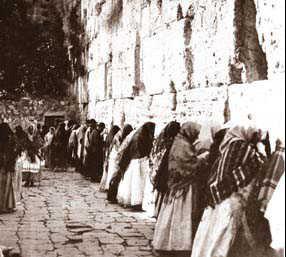 We’re at the cemetery, a coupleweeks before Rosh HaShanah, when it’s customary to visit your deceased lovedones. Ours are all in the same place. Most of them are buried within a few feetof each other.
We’re at the cemetery, a coupleweeks before Rosh HaShanah, when it’s customary to visit your deceased lovedones. Ours are all in the same place. Most of them are buried within a few feetof each other.My grandmother, who I call Baba,died the first day of Sukkot, 2007; her husband, my zaidy (grandfather), diedthe day after Yom Kippur, 1988. Within six days of each other, twenty yearsapart.
Stones are the theme of the day. First,we put small stones on their gravestones, as custom dictates. (I’m not quitesure why we do it. My mom always said that it’s to show people were there, butI feel like there has to be more of a spiritual explanation there.) Second, welook down at Baba and Zaidy’s graves, at the bed of stones covering theirbodies. (Baba always wanted to have the bed of stones on Zaidy’s grave, but shenever did it. When she died, my mom and aunt finally got them both the bed. I’mnot crazy about the look, but Baba wanted it.) Third, I look at Baba’s matzevah(gravestone), whose unveiling wasn’t even a year ago. (It still ticksme off that my cousin, who put together the gravestone, spelled her name wrong.But whatever. The look of the gravestones is still nice, they match andeverything.)
Jacob slept with stones aroundhis head one night while traveling, and they morphed into one when he woke upin the morning. He also moved the stone off the well for Rachel. Striking therock instead of talking to it was why Moses died before entering Israel. He alsocommanded that the Torah be written on stones, so that way the Jews couldn’tforget them. Both men were associated with a lot of strong women. Jacob has hismother Rebecca, his wives Bilhah, Rachel, Zilpah, and Leah, and his daughterDina; Moses had his biological mother Jochebed, adoptive mother Batya, sisterMiriam, and wife Zipporah. I guess stones are a women's thing.
As I put my little rock on Baba’smatzevah, my heart twists when I remember the unveiling. Perakim (chapters) oftehillim (psalms), said in her memory. Only one said by a blood relative. Onlythree said by relatives at all. The rest said by complete strangers to me,and probably to her too. Just because they were all men. I wasn’t allowed tosay a perek (chapter). Neither was my mom or my aunt. Women who were completestrangers weren’t allowed either. Only men who are complete strangers areallowed to say a perek of tehillim to elevate her nishama (soul).
We visit the other few relativesand friends right by Baba and Zaidy, then get in the car to go see my mother’s grandmother, who I call Bobbe. I never knew her, but she was very close with mymother, so I feel a connection to her. She was the first known woman in what Icall the Line, the Line of strong women in our family. I wear the earrings shebought for my mom, gold balls with little notches as a design.
This area of the cemetery isolder; the death dates on the gravestones are from the 40s and 50s. Bobbe diedin 1976, though. She’s next to a few other family members who died morerecently, too.
I get a little upset in the caron the way to Bobbe, but I manage to control myself. I put the rock on hermatzevah, and I’m still okay. But I break down when Ma and I walk behind Bobbeand see Beyla Giti. Bobbe’s granddaughter, my mother’s first cousin, who wassix when she died. She left this earth several years before her grandmotherdid.
The grave is for a small body, achild’s. It rips my heart out to see it, and I start to cry. I don’t even knowhow she died; I never wanted to ask. It says “yaldah yekara,” precious girl, onthe matzevah. She was a girl. A little one. It makes me hurt even more.
It also hurts to know that noneof these women had proper sendoffs. Their bodies were guarded by men, preparedby men, buried by men, eulogized by men, memorialized every year by men.
Why couldn’t my mom say Kaddish, the mourners' prayer,for my bobbe? Yes, it’s a burden to have to be in synagogue three times a dayevery day to say it, but it’s a burden every child takes on for his or herparent. But that burden went to son-in-law and cousin by marriage rather thandaughters.
No. Not for my mom. I won’t letit be. When God takes her, she’ll get a year’s worth of Kaddish from me. Nother brother-in-law, not a cousin, not her nephew. Me.
Dear readers, the deadline for the Star of Davida essay contest is fast approaching! Read here for all the details.

